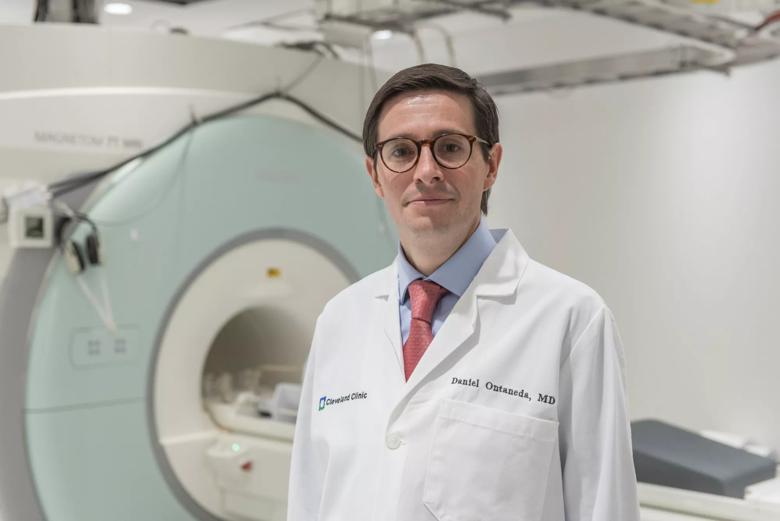Award provided by Patient-Centered Outcomes Research Institute
Cleveland Clinic News Service | 216.444.0141
We’re available to shoot custom interviews & b-roll for media outlets upon request.
CCNS health and medical content is consumer-friendly, professional broadcast quality (available in HD), and available to media outlets each day.

A Cleveland Clinic research team has attained a $10.6 million award from the Patient-Centered Outcomes Research Institute (PCORI) to compare the effectiveness of treatment options for multiple sclerosis (MS).
Led by Daniel Ontaneda, M.D., a neurologist in Cleveland Clinic’s Mellen Center for Multiple Sclerosis, the project will be the first to compare two treatment options for patients recently diagnosed with the relapsing remitting form of the disease. MS is a leading cause of disability among young adults in North America and Europe, affecting over 2.5 million people worldwide.

Image content: This image is available to view online.
View image online (https://assets.clevelandclinic.org/transform/875d6c3d-822b-42f1-b134-9526c5f354a7/129839_09-21-17_KB_022-scaled_jpg)
Daniel Ontaneda, M.D., neurologist, Cleveland Clinic’s Mellen Center for Multiple Sclerosis
When deciding on treatment, neurologists typically use one of two approaches: an escalation approach, which starts with a drug that is considered safe but with a modest likelihood to control MS activity (attacks and new lesions), then escalating to more potent therapies; or an early highly effective treatment approach, which involves giving a high-efficacy drug, with the rare potential for side effects, as the first-line treatment. There is currently no evidence comparing these two approaches in a head-to-head trial.
“The results of the study will provide an important framework for overall treatment choices for relapsing-remitting MS,” said Dr. Ontaneda. “Currently, there is not much information available to help patients and their caregivers. Our findings will help guide treatment decision making for patients and hopefully have a major impact on the field of MS.”
The multicenter randomized clinical trial aims to determine which approach is better at slowing brain volume loss, is safer, is more effective, or is better tolerated. The study will measure how well participants function in several areas, including cognition, arm and leg function, and eyesight. The team asks participants’ perspective of their MS symptoms, quality of life measures for neurological disease, and satisfaction regarding their treatment.
The data produced will directly help people with relapsing-remitting MS weigh the balance between the potential benefits and risks of disease-modifying therapy by comparing the two approaches. The results will also help insurance payers and government agencies make more informed decisions on medication coverage, with the overall cost of long-term disability being a driving factor. The study results will help guide overall treatment philosophy and will be applicable to a wide range of both existing and new therapies, meeting a significant unmet need in patient decision making and aiding the decision for medication approval by third parties. Thus, this project has the potential to affect a large number of people with relapsing-remitting MS.
“This project was selected for PCORI funding for its potential to fill an important gap in our understanding of MS treatment. It will provide useful information to help patient and their caregivers weigh the effectiveness of their care options,” said PCORI Executive Director Joe Selby, MD, MPH. “We look forward to following the study’s progress and working with Cleveland Clinic to share the results.”
Dr. Ontaneda’s award has been approved pending completion of a business and programmatic review by PCORI staff and issuance of a formal award contract.
PCORI is an independent, nonprofit organization authorized by Congress in 2010. Its mission is to fund research that will provide patients, their caregivers, and clinicians with the evidence-based information needed to make better-informed healthcare decisions. For more information about PCORI’s funding, visit www.pcori.org.
Cleveland Clinic is a nonprofit multispecialty academic medical center that integrates clinical and hospital care with research and education. Located in Cleveland, Ohio, it was founded in 1921 by four renowned physicians with a vision of providing outstanding patient care based upon the principles of cooperation, compassion and innovation. Cleveland Clinic has pioneered many medical breakthroughs, including coronary artery bypass surgery and the first face transplant in the United States. Cleveland Clinic is consistently recognized in the U.S. and throughout the world for its expertise and care. Among Cleveland Clinic’s 82,600 employees worldwide are more than 5,786 salaried physicians and researchers, and 20,700 registered nurses and advanced practice providers, representing 140 medical specialties and subspecialties. Cleveland Clinic is a 6,728-bed health system that includes a 173-acre main campus near downtown Cleveland, 23 hospitals, 280 outpatient facilities, including locations in northeast Ohio; Florida; Las Vegas, Nevada; Toronto, Canada; Abu Dhabi, UAE; and London, England. In 2024, there were 15.7 million outpatient encounters, 333,000 hospital admissions and observations, and 320,000 surgeries and procedures throughout Cleveland Clinic’s health system. Patients came for treatment from every state and 112 countries. Visit us at clevelandclinic.org. Follow us at x.com/CleClinicNews. News and resources are available at newsroom.clevelandclinic.org.
Editor’s Note: Cleveland Clinic News Service is available to provide broadcast-quality interviews and B-roll upon request.